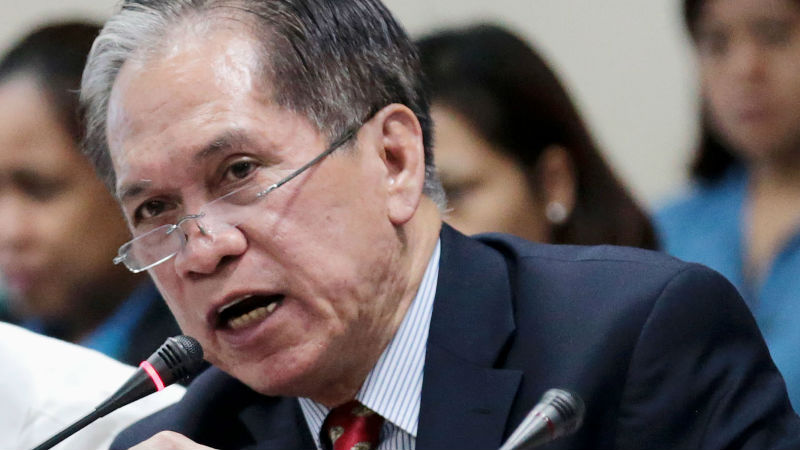
Senen Bacani, member of the government’s peace panel, raises a point during the public hearing on the Bangsamoro Basic Law at the Senate on Tuesday. INQUIRER PHOTO/GRIG C. MONTEGRANDE
Senators on Tuesday expressed alarm delays in the decommissioning process could result in a third of the Moro Islamic Liberation Front (MILF) fighters still bearing arms during the planned elections for the Bangsamoro parliament in 2016.
At a Senate hearing on the draft Bangsamoro Basic Law (BBL), Senen Bacani, a member of the Aquino administration’s peace panel, acknowledged that the decommissioning would not be 100-percent complete by next May, as initially envisioned.
The process had faced delays because of various factors, including the massacre of 44 Special Action Force commandos on Jan. 25 in Mamasapano in an MILF-controlled area of Maguindanao province that sparked national outrage, Bacani said.
The ceremonial turnover of 20 crew-served weapons and 55 high-powered firearms from the MILF could be expected this month, Bacani said. This would have been done earlier, except for intervening events, he added.
“They’re just planning today the actual date of the ceremonial turnover and the subsequent events,” he said.
Before the turnover, the validation and verification of forces and arms of the MILF also had to be done, he said.
“It’s the end of the process in terms of the validation and verification. The numbers are with the independent decommissioning body,” he said, when asked about the number of MILF fighters and their weapons.
Senen said the second phase of the process envisioned the decommissioning of 30 percent of the MILF force by the ratification of the draft BBL, the charter of the Bangsamoro substate.
The complete decommissioning is expected two months before the signing of the exit agreement, which would mean both parties have complied with all agreements, he added.
Sen. Ralph Recto said given the developments, “in short, when elections roll around next year, not all firearms would have been turned over [to the government].” Recto then asked how many arms would remain with the MILF.
Bacani said the MILF would be holding “hopefully about 35 percent” of its arms during the elections, but added that the government did not really agree to this kind of schedule. Subsequent events just delayed the decommissioning, he added.
“As you know, the Comprehensive Agreement on the Bangasamoro was signed March 2014 … The idea was to have the complete decommissioning by May 2016. Ideally, no political party should be holding arms during elections, but because of the delays in the decommissioning process, for one reason or another, [they would still have arms],” Bacani said.
Gun ban
Sen. Ferdinand Marcos Jr., who chairs the local government committee heading deliberations on the draft BBL, expressed concern.
“So there’s a distinct possibility, and it’s probably actually more than just a possibility but a likelihood, that when there’s an election for the Bangsamoro parliament, many of the MILF would still be armed,” Marcos said.
He said everybody knew what would happen when one group is armed during an election. “We have a vast experience in what happens during such a situation,” he added.
But Bacani said there was a solution to the situation. According to him, the “absolute gun ban for all parties” during elections had proved effective in the past. The 2013 elections were a testament to this, he added.
But Marcos said while the gun ban would prevent the bearing of arms, these would remain in storage. If there’s nobody to implement the gun ban, MILF members could carry these during the polls, especially in far-flung areas, he said. “I’m not saying it only happens in Muslim Mindanao. It happens in all localities. It’s a problem,” he said.
Police control
Marcos also questioned the Philippine National Police supervision over the Bangsamoro police, and said he did not want the Bangsamoro police to be turned into anybody’s private armed group.
Marcos noted that the Bangsamoro chief minister under the proposed BBL had operational control and supervision over the Bangsamoro, which he said was a power not granted to other local officials.
The draft BBL, he observed, provides that the Bangsamoro police director and two deputies would also be selected by the chief minister. The police director, on the other hand would appoint the police officers and other personnel.
Marcos asked whose order to the Bangsamoro police would prevail between that of the chief of the Philippine National Police and the chief minister of the Bangsamoro.
Bacani said this matter had been clarified several times, and that in case of differences of opinion between the PNP chief and the minister, it’s the PNP chief who would be followed. Bacani also said the Bangsamoro police would be part of the PNP. “It’s not an independent police force,” he said.
But Marcos said representatives of the Department of the Interior and Local Government could not satisfactorily explain which order would prevail in case of conflicting directives from the Bangsamoro chief minister and the PNP chief.
Marcos also said the draft BBL should ensure that members of the Bangsamoro police would undergo the same selection process and would be asked to meet the same qualification requirements of regular PNP members.
“The critical point here is we want a consistency across the country about the quality of our policemen,” he said.
Task force
On Saturday, the government and MILF peace panels signed in Kuala Lumpur an agreement creating a task force that would address the “socioeconomic and development programs” of the decommissioned MILF combatants and their communities.
In a statement, the Office of the Presidential Adviser on the Peace Process said the task force was mandated to “undertake all efforts related to socioeconomic and development programs” and to “assist the panels (to) identify and implement socioeconomic priorities and development projects” for decommissioned MILF combatants and their communities.–With a report from Nikko Dizon
RELATED STORIES
Ex-MILF spokesman doubts Moro fighters will turn over weapons
MILF to decommission firearms in February